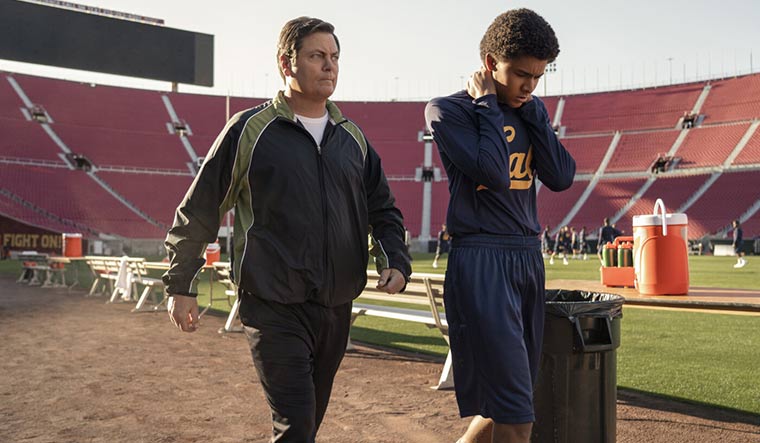When Colin Kaepernick knelt as the US national anthem played before an American football game in 2016, it created ripples in the nation’s sporting community. The quarterback continued doing it for several months—sometimes joined by teammates—to protest racial inequality and police brutality in the US. Before he knew it, his act would make waves around the world.
As athletes and sportspersons continue to join the movement to spotlight racism in sport and society, Netflix has released an original docudrama series on the formative years of the sports icon-turned-activist.
Colin: In Black and White tells the tale of a biracial Kaepernick growing out of his comfort zone in a privileged life with white adoptive parents. He starts to notice society’s microaggressions towards him and gets turned off by ‘compliments’ of him being “one of the good ones” among people of colour.
The show is a dramatised version of Kaepernick’s early-to-mid teenage, when he is on the verge of becoming a sports superstar. He serves as a narrator for the show, comparing instances in his life to America’s history of racial discrimination.
Cut to 2021, when Black Lives Matter and ‘taking the knee’ are part of a global movement that has grown stronger despite the pushback by western conservatives, who call it a purely political movement. At the T20 World Cup, with many players taking the knee, it has become the norm, rather than the exception. And South African wicketkeeper Quinton de Kock's initial refusal to do it met with such criticism, he had to apologise. The tables have turned.
Racism in cricket is as real as it gets. There are infamous incidents like the ‘Monkey-gate’ involving Harbhajan Singh and Andrew Symonds in 2008, recent revelations of discrimination in the South African camp, and West Indies’ Darren Sammy revealing that several Indian players used to refer to him by the colour of his skin in the Indian Premier League.
But de Kock’s point was that he did not want to be a part of a mere gesture. In other words, he found no curative power in the action. The heart of the matter, then, is the matter of the heart.
“Just because rules are changed, doesn’t mean hearts are changed,” says Kaepernick, referring to the change in laws to ensure equal opportunity. It has been five years now since he first took a knee, and athletes want to know if it is an empty gesture now or if it is changing hearts.
Like de Kock, footballer Marcos Alonso also refused to take the knee. He said he prefers to stand and point to the English Premier League’s ‘No Room for Racism’ badge on his sleeve before kick-off.
The EPL and European football body UEFA are among the major organisations trying through rigorous campaigns to drive home the message that racism in society is unacceptable. It is usually in team sports environments that hooliganism and aggressive crowds thrive, which sometimes leads to racist chants.
American leagues, like the National Basketball Association, National Football League and Major League Baseball, have all aggressively backed the Black Lives Matter movement since the horrifying murder of George Floyd last year. Using sports as a vehicle to drive social change is not a new concept, but major sporting bodies are taking up the cause like never before, aware of their reach.
Psychologists have been demanding that society also pay attention to the mental health effects of racism in sports.
“To address racism and mental health in football and other sports is to move from a model that sees the individual as a subject of fear needing to be diagnosed to a structural analysis of the way sport enables forms of abuse that, while rarely regarded as a mental health concern, might have a profound impact on the wellbeing of black sportspeople,” wrote former English footballer Michael Bennett in medical journal The Lancet.
It is these mental breakdowns and challenges that Kaepernick wants non-black audiences to witness through his lens in Colin. He finally gets a platform to speak at length without critics (read Donald Trump) shouting him down.
Then again, a defining feature of the culture wars these days is hyperbole. And Kaepernick indulges in it, too. The series opens with him comparing the NFL’s rigorous pre-selection physical tests to slave trade. Ignoring that the selected, irrespective of colour, go on to become multimillionaires is one of the few things Kaepernick gets wrong in an otherwise thought-provoking series.
So, what do Kaepernick and his movement mean for Indians?
The Indian cricketers are taking the knee at the World Cup on the instruction of the BCCI, a gesture that is drawing flak. Taking the knee is essentially intertwined with the Black Lives Matter movement. For other cricketing nations showing their solidarity—be it Australia, England, South Africa or the West Indies—discrimination against blacks requires to be addressed.
But when Indian cricketers take the knee in a match against Pakistan, one would imagine there are much more pressing social issues in the country that the players chose to ignore. They do have an unfair cross to bear in an increasingly divisive Indian society. But if the Indian cricket board and its players want to borrow a leaf from Kaepernick’s book, for a social message to be relevant in India, all lives should matter as much as black lives matter.



